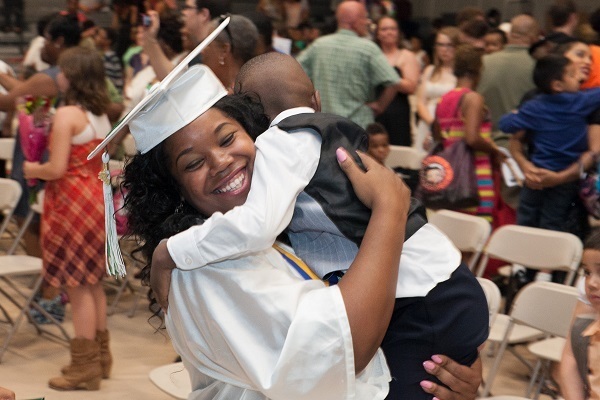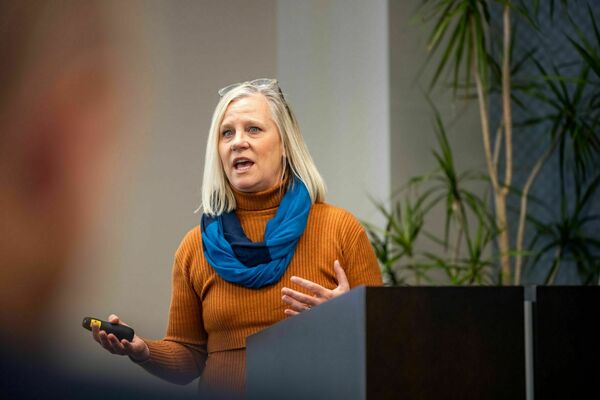
If you’re one of the 31 million American adults who didn’t graduate high school, you’ve likely had someone suggest that you should “just get your GED.”
A General Education Diploma (GED) is often quicker and easier to obtain than a traditional diploma. It’s seen by many as a quick fix for those without a high school diploma. However, the difference is vast—$9,600 in reduced income, for starters. According to the U.S. Bureau of Labor Statistics 2018 report, those with the GED earn an average of $9,600 less annually than those with a high school diploma.
Beyond these financial challenges for those who don’t graduate high school, a GED can be the end of educational potential. The process of earning a GED is less rigorous than that of earning a traditional diploma, meaning a GED may be less effective in offering opportunities for better employment and access to higher education.
GED holders also face social stigmas. GEDs may be considered a diploma substitute on paper, but they often come with baggage that can lead to further alienation by employers and institutions. The opportunity to earn a traditional diploma is an opportunity to gain confidence and societal acceptance as a person pursues their potential.
The collaboration between Notre Dame’s LEO and the Goodwill Excel Center of Central & Southern Indiana, an accelerated learning program for adults, is seeking to change the course for adults who didn’t graduate from high school. This is the story of how these two organizations came together to turn evidence into action and action into sustainable, repeatable success.
LEO in action
With a background in consulting schools, nonprofits, and state governments, as well as experience working with policymakers at the federal level, LEO Associate Director Rachel Fulcher Dawson has a passion for evidence-based policy.
“I joined LEO because my work in education policy and early childhood education research has shown me the power of evidence in improving outcomes for our most vulnerable populations,” she says.
Whether identifying impactful community programs, publishing academic research, or working with key policymakers and think tanks in DC, Rachel has spent her career as a champion of the role of evidence.
“We are always beating the drum of why evidence matters,” she notes. “We want to build an appetite for evidence because it helps people make informed decisions.”
Engaging with LEO is intended to give programs more than access to rigorous research. It’s a true collaboration that provides outside policymakers proof a program works. “It’s not just about sharing evidence with an individual, but they can also say, ‘Notre Dame’s LEO has validated this program works and it’s cost effective,’” Rachel explains.
Why the Goodwill Excel Center?
Rachel identifies three indicators that LEO uses to determine if a program will be a good fit for partnership: a focus on unique policy gaps, organizational dedication to evidence, and leadership that is highly involved and motivated.
The Goodwill Excel Center, first founded in Indianapolis and now operating charter schools across Indiana, Missouri, Arkansas, Texas, and Washington, DC, was a perfect fit in every category.
While many programs exist to help people get GEDs, far fewer exist with a focus on helping adults earn high school diplomas. Adult students often cannot access traditional high schools due to state policy constraints. When they are able to return to school, they face significant financial burdens and childcare needs.
The Excel Center shares LEO’s dedication to evidence to address these barriers. As Rachel says, “they were looking for LEO.”
Vitally, the Excel Center had someone at the helm who was completely dedicated to evidence-based action and driven to replicate their success in communities across America: Chief Mission & Education Officer Betsy Delgado.

Turning passion into problem solving
Betsy Delgado began her education journey as an English teacher and athletics coach. She had firsthand experience with the complex challenges facing students in traditional high school. Through her work as an educator in both California and England, she felt the pull to help students who dropped out.
“We tend to blame people for not finishing because we’re experiencing that person as an adult,” says Betsy, “when in reality most drop out when they’re 14 or 15, sometimes to work to support their families.”
Betsy moved to Indianapolis and her work with Goodwill began. She found numerous ways to remodel and relaunch the Excel Center program to address why students weren’t graduating. As Betsy immersed herself in the program and leaned on the expertise and resources of the LEO team, she began to see changes.
Developing the approach
Betsy is quick to note that the program’s revamped model is due to the hard work of many, from LEO to the phenomenal program managers to the teachers in their program. “I wish I could take credit for it all—so many people were responsible for relaunching the model,” Betsy shares.
The first thing they sought to improve was lowering the barriers students faced while working towards earning a high school diploma. Take childcare as an example—a major obstacle for adults seeking traditional high school diplomas. “The motivation is there,” explains Betsy, but nearly 50% of adults without a diploma have children. “That’s over 15 million people who do not have the resources to join the economy in a meaningful way.”
To help address this issue, the Goodwill Excel Center offers students free childcare on-site. The program also offers bus passes and gas cards to ease the financial burden of commuting to campus. Flexible class schedules help students keep their work obligations.
Beyond financial and logistical support, Betsy and her team formed a system of intense, personal coaching to help students navigate all of life’s roadblocks. Students have access to employment mentors, life coaches, and post-graduation guides to help ensure success.
In addition to enabling students to earn a 40-credit traditional diploma in just two and a half years, the Excel Center also allows students to earn a variety of industry-recognized certifications and take classes for dual college credit.
While Betsy and her team know that not every student will pursue further education beyond the diploma, they believe that the Excel Center’s rigor sets students up for greater success no matter what they pursue.
In every step of the process, Betsy and her team have been in lock step with LEO. In the Excel Center’s model, Rachel sees lessons other nonprofits can learn. “Betsy and her team are smart about how they have designed their program, built evidence, and orchestrate revenue streams around it,” Rachel says.

Evidence to action
Through LEO’s partnership, the Goodwill Excel Center has gained access to advisors, researchers, and better tools to build evidence as they fine tune their system.
Betsy shares, “Often in nonprofits, we have a lot of great ideas, but we don’t necessarily know how to scale. By partnering with LEO, we have really accelerated our vision and opportunity.”
LEO helped the Excel Center conduct a massive study of the students at the Central and Southern Indiana campuses—analyzing data from 10,114 program applicants—to understand the economic outcomes of the program on graduates.
The study suggests that graduates make more money, receive higher-level job opportunities, and enroll in college more frequently than their peers. Graduates saw a 39% increase in their earnings following the five-year period after applying to the program. Graduates were 11% more likely to be employed in a formal labor sector and 33% more likely to go on to enroll in either college or a professional certification program.
Importantly, data from the study indicates that graduates learned life skills they would not have acquired in a GED program. Through evidence collected showing that graduates are far more likely than their peers to change careers, the study suggests that new skills learned in the program can open new doors for graduates.
A more equitable future together
Having collected evidence to validate the effectiveness of the value add of the program for its students, LEO and the Goodwill Excel Center have randomized controlled trials underway at campuses in other states to study different program variables. With this evidence, they will continue to tweak and optimize the program to encourage even higher graduation rates among students as they develop a system that can continue to be applied, replicated, and scaled to other centers and other states.
“We’re already working to replicate the model, to get as much evidence as possible, to understand the program’s impact,” says Rachel. “Betsy is already working her tail off in multiple states.”
Rachel and Betsy know the future is bright as LEO and the Excel Center work together, combining each other’s strengths and visionary approaches to addressing policy gaps in adult education.
Their partnership is doing more than just proving out the importance of evidence in public policy—it’s changing the trajectory of lives.
“Over 50% of our students have one or both parents who did not graduate high school,” says Betsy. “So when they walk across our stage, they are changing generations of poverty.”